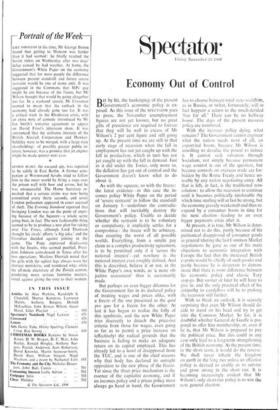Economy Out of Control
BIT by bit, the bankruptcy of the present ',Government's economic policy is ex- posed. As this issue of the SPECTATOR goes to press, the November unemployment figures are not yet known, but no great gifts of prescience are required to foresee that they will be well in excess of Mr Wilson's 2 per cent figure and still going up. At the present time we are still in that early stage of recession when the fall in employment has not yet caught up with the fall in production, which in turn has not yet caught up with the fall in demand. Just as it did under the Tories, only more so, the deflation has got out of control and the Government doesn't know what to do about it.
As with the squeeze, so with the freeze: the latest evidence—in this case the in- comes policy White Paper on the period of 'severe restraint' to follow the standstill on January 1—underlines the contradic- tions that will inevitably destroy the Government's policy. Unable to decide whether the restraint is to be voluntary or compulsory, it implicitly settles for a compromise: the freeze will be arbitrary, thus ensuring the worst of all possible worlds. Everything, from a simple pay claim to a complex productivity agreement, is to be permitted only if it 'serves the national interest'—yet nowhere is the national interest even roughly defined. And this is described, believe it or not, in the White Paper's own words, as 'a more ob- jective assessment' than is customarily made.
But perhaps an even bigger dilemma for the Government lies in its declared policy of treating wages and prices alike, with a freeze of the one presented as the quid pro quo for a freeze for the other. At last it has begun to realise the folly of this symbiosis, and the new White Paper tries discreetly to detach the price-rise criteria from those for wages, even going so far as to permit a price increase on (effectively) the radical grounds that the business is failing to make an adequate return on its capital employed. This has already led to a howl of disapproval from the TUC, and is one of the chief reasons why that body has declared its outright opposition to the new phase of the freeze. Yet since the (free) price mechanism is the essence of the capitalist economy, and if an incomes policy and a prices policy must always go hand in hand, the Government has to choose between total state socialism, as in Russia, or (what, fortunately, will in fact happen) a return to the much-derided `free for all.' There can be no halfway house. The days of the present incomes policy are numbered.
With the incomes policy dying, what remains? The Government cannot engineer what the nation needs most of all, an export-led boom, because Mr Wilson is unwilling to devalue the pound to induce it. It cannot seek salvation through Socialism, not simply because permanent wage control is out of the question, but because controls on overseas trade are for- bidden by the Rome Treaty and hence un- usable by any nation negotiating entry. All that is left, in fact, is the traditional non- solution : to allow the recession to continue until it becomes politically intolerable (by which time sterling will at last be strong, but the economy gravely weakened) and then re- expand by a consumer boom in time for the next election—leading to an even bigger payments crisis after it.
At present, it is true, Mr Wilson is deter- mined not to do this, partly because of his puritanical disapproval of consumer goods in general (during the last Common Market negotiations he gave as one of his main objections to economic integration with Europe the fact that the increased British exports would he chiefly of such goods) and partly because he is desperate to demon- strate that there is some difference between his economic policy and classic Tory stop-go. But sooner or later he will have to give in, and the only practical effect of his antipathy to candyfloss will be to prolong the recession still further.
With so bleak an outlook, it is scarcely surprising that even Mr Wilson should de- cide to stand on his head and try to get into the Common Market. So far, it is doubtful whether General de Gaulle is pre- pared to offer him membership, or, even if he is, that Mr Wilson is prepared to pay the political price. But this could in any case only lead to a long-term strengthening of the British economy. At the present time, in the short term, it would do the reverse. We shall never inherit the kingdom on earth in the long run unless an effective policy is devised to enable us to survive and grow strong in the short run. It is becoming increasingly evident that Mr Wilson's only short-run policy is to win the next general election.














































 Previous page
Previous page